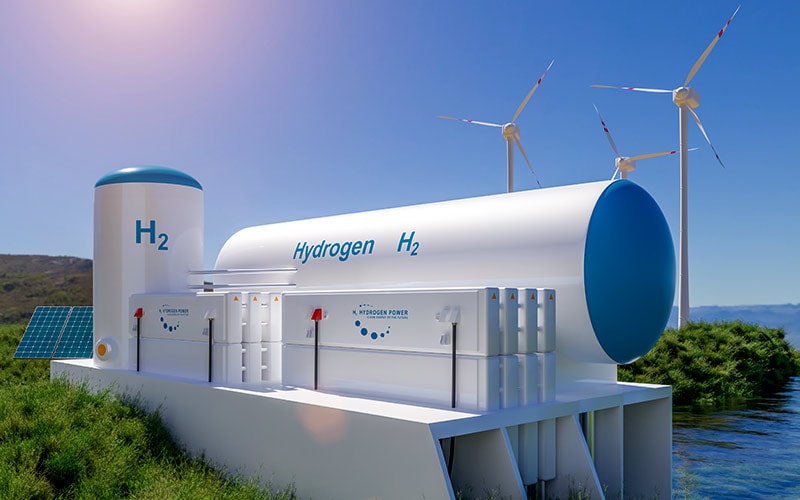- Rising energy demand will exponentially expand the volume of data used to optimally operate power systems. Available security and connectivity infrastructure will also fall short.
- With more data and nodes, traditional computers won’t suffice for many problems in the energy sector.
- Here, quantum computing can help. For example, placing power generation facilities appropriately, deciding which power generation units to fire up and when, and using quantum ML for fault detection.
- Quantum computing has attracted the interest of many energy and utility companies. Several global and regional players are already exploring applications in partnership with quantum tech firms.
- However, quantum computing adoption requires specialized skills, strong data management practices, and a clear understanding of the technology’s capabilities and limitations.
- Therefore, energy companies must prepare well to benefit from quantum computing.
Global energy demand is set to increase by 50% over 2018-2050 to reach 900 quadrillion British thermal units,1 according to the U.S. Energy Information Administration. At the same time, the call for sustainability is getting louder. To deliver more energy more efficiently, energy companies need to revise their generation, transmission, and distribution strategies.
As global energy networks grow, the sophistication of the infrastructure needed to sustain them also rises. There are two reasons for this: first, the expansion of distributed energy systems such as solar and thermal, or smart homes generating their own energy, and second, the emergence of new load types such as electric cars as well as a general increase in demand more broadly. Together, these factors exponentially expand the amount of data needed to maintain, process, and optimize power systems. They also add pressure on the security and connectivity infrastructure.
As the number of nodes increases exponentially, traditional computing architecture will struggle to cope. Transaction processing and decision-making time will be reduced to a snail’s pace (Figure 1).

But decision-making speed is important because of the high costs of storing electricity. In most cases, you either use it or lose it. This is where quantum computers can come to the rescue.
Using quantum computers in the energy and utilities sector
Quantum computing is still in its infancy. Academics, scientists, and technologists are all still exploring its real-world applications. For its part, the energy sector has already identified a few applications. These include using quantum simulation, optimization, machine learning (ML), cybersecurity, and chemistry to solve sector problems. However, not all are equally important (Figure 2). For instance, some areas of quantum simulation and optimization are more useful for the energy sector than others. Let’s explore some of the key use cases.

Facility location allocation – With growing reliance on renewable sources such as solar and wind, power generation networks are highly complex to manage. Energy companies have to optimally place generation facilities in order to minimize capital and operational costs. This requires considering a wide range of variables, such as competitors’ location, demand, grid constraints, hazardous material discharge, and routing of raw materials. Classical computing does help this decision-making to some extent. However, as the number of facilities grows, the computational time to get a solution goes up exponentially. Quantum computing can provide viable solutions in reasonable runtimes for such energy system optimization problems. For example, in a simulation to optimally locate 14 facilities, a single-core CPU took about 11 hours whereas a quantum processor solved it in just 16 minutes.2
Unit commitment – This is another optimization problem that could revolutionize the energy sector. A typical power company operates hundreds or thousands of generation units with specific capacities and costs. However, the demand for power fluctuates constantly. To meet power demand while minimizing operating cost, companies have to make real-time decisions about starting up or shutting down generation units. These decisions are based on many factors, including fixed and variable costs from different units, grid and unit constraints, load forecasts, heat rate curves, and sustainability concerns.3 The increase in the number of generation units renders classical computing-based decision-making systems ineffective. Here, quantum-inspired techniques have proved to be effective. Microsoft has already demonstrated its quantum-inspired algorithm for unit commitment, which works much faster than classical solvers.
Fault detection using quantum ML – Power grids have a wide geographic spread, and the slightest of defects or faults can disrupt power supplies. These faults can be caused by storms, downed trees, transmission line breakdowns, or even changes in voltages or loads, etc. It is crucial to detect and correct these faults as quickly as possible. ML has emerged as a key tool for correcting faults quickly. Using quantum computing for ML is an area that is gaining prominence among researchers and industry. Even though the field is still in its infancy, the idea is promising. Initial experiments by Infosys to use quantum for ML showed a better learning curve and more resilience against noise in the process.
Quantum could be used for a wide range of applications in the energy sector, such as to simulate variables in material sciences and chemistry to develop cleaner fuels, lower emissions, and boost energy efficiency. Or as electric mobility becomes mainstream, quantum could help optimize placement of electric charging stations based on population and traffic. It also has applications in safeguarding consumer data and smart grids with quantum key distribution — a quantum-based encryption system. It is believed to provide unbreakable safety against cyberthreats and data breaches.
Quantum computing can help develop cleaner fuels, reduce emissions, and increase energy systems’ efficiency
With so many exciting areas of application, energy companies using quantum computing will be able to serve their customers better while lowering monetary and environmental costs. But quantum is still on a steep evolutionary curve.
Roadblocks to quantum adoption
Despite rapid developments in quantum hardware and software, energy companies have a long way to go to commercially adopt the technology. Some adoption challenges stem from technical difficulties and limitations of the technology itself, whereas others emerge from the engineering-heavy background of the energy sector. While some energy companies have identified the potential of quantum computing applications, the majority are still struggling to get started.
Being a highly complex and technical field of study, quantum computing requires specialized knowledge of both its hardware and software to develop viable solutions. Not surprisingly, energy companies do not possess knowledge of quantum computing and struggle to get the right talent onboarded. This forces them to heavily rely on external parties with quantum expertise to identify and develop proofs of concept.
Power generation and distribution companies have historically struggled to adopt and integrate new technologies, mostly due to their legacy systems. The possibilities of quantum computing are immense and the field is rapidly evolving. As the sector is seeking to derive value from quantum it would need to revamp existing technology setups across generation, transmission, and distribution segments.
Another area that requires significant change is the sector’s data management practices. A unified way of generating, storing, and accessing data for quantum algorithms is a must-have for successful adoption of the technology. However, data management practices in the sector are still evolving, and quantum-ready data is virtually nonexistent. This makes finding the right data input for quantum models and programs extremely challenging.
Regarding the limitations of quantum technology, the volatile nature of qubits can lead to alteration or loss of output. Additionally, quantum computers can only provide ranges and not deliver accurate outcomes. This makes them unreliable as precise outputs on which to base business decisions. Last, due to the technology’s highly technical and complex nature, most quantum hardware and software resides within a handful of tech companies. For energy companies to use these quantum systems, their data has to go outside the organization, making data privacy an area of concern.
The effort needed to overcome quantum adoption challenges is daunting, but the benefits have kept the interest of energy companies, utilities, and even regulators high.
Energy and utility companies adopting quantum
The sector is enthusiastically exploring applications for quantum computing. Companies of different sizes and focus areas are joining forces with established and niche technology players to identify and test use cases. However, the objectives of quantum initiatives differ among players. Some are making headway in order to get ahead of the competition, while others are exploring operational efficiencies.
European utilities major E.ON is using IBM’s quantum computing capabilities to optimize decentralized power generation.4 The company is also exploring the technology to develop use cases, including superior batteries and more-efficient electric vehicle materials; climate models for energy optimization; optimal energy procurement, trading, and hedging; and many more.5
It is not only the large energy companies that are exploring quantum; the field has even gotten attention from government-owned utilities and federal agencies. For example, Dubai Electricity and Water Authority (DEWA) joined forces with Microsoft to explore applications of quantum computing in energy optimization.6
Similarly, the U.S. Department of Energy awarded a quantum simulation project to Rigetti Computing.7 As part of the contract, the company will collaborate with Livermore National Laboratory and the University of Southern California to simulate plasma dynamics on Rigetti’s cloud-based quantum computers. The objective of this project is to make advancements in sustainable energy through fusion energy.
Even large integrated energy companies are exploring quantum computing to refine their future business models. Companies such as BP8 and ExxonMobil9 have joined IBM’s quantum network to identify viable solutions to some of the most pressing optimization challenges. ExxonMobil plans to use IBM’s quantum capabilities to optimize its liquefied natural gas shipment routings, whereas BP intends to boost operational efficiencies and bring down its carbon footprint. Another energy major, TotalEnergies SE, is working with QC Ware to explore quantum optimization algorithms.10 The objective is to test quantum computing’s potential to model continuous variables and run optimization on several use cases for TotalEnergies’ operations.
Getting quantum ready
The unilateral way of operating for energy companies is already becoming history. Sector transformation requires computing power that can handle a high number of variables and solve problems within a reasonable time frame. Quantum computers are rising to the occasion. While there is a lot of promise, there is a lot to be explored as well. The key is to start ahead of the competition, identify strategically important areas of application, and establish quick wins.
First, it is crucial to understand what quantum computers can and can’t do. For this, business executives will have to develop a basic understanding of the technology to identify relevant use cases. For example, quantum computers can shortlist optimum sites for facility location. However, they cannot zero in on the exact site, and companies would need a classical computer to augment human decision-making.
From the set of identified use cases, businesses can prioritize based on their value to the business. This would help executives get budget approvals swiftly and demonstrate quick wins as well. However, there is no silver bullet for prioritizing. Both business and IT executives should work together to identify areas of high strategic importance. For example, energy company A might find higher value in using quantum computing to optimize distributed generation, while company B might find it more useful for regulatory engineering.
Last, as this is a highly complex field of study, it is important for energy companies to tap the right quantum expertise. This would enable them to quickly validate proofs of concept and deploy solutions. It is important to note that not all quantum capabilities reside with a single player, and a company might have to forge more than one relationship to get the right mix of technical know-how. For instance, expertise in quantum-safe encryptions might sit with tech company A, and the quantum hardware to deploy it might be available from tech company B. Here, to make its data quantum safe, an energy company would have to work with both tech players simultaneously.
Right quantum expertise is the key to quick validation and deployment of quantum solutions
Quantum computing offers immense potential to solve some of the most challenging problems in the energy industry. These solutions are essential not only for competitive advantage but also for sustainability. For cleaner and more efficient operations, energy companies should get started today on exploring and developing quantum solutions.
References
- EIA projects nearly 50% increase in world energy usage by 2050, led by growth in Asia, Sept. 24, 2019, U.S. Energy Information Administration
- Quantum computing for energy system optimisation, Jirawat Tangpanitanon, Dec. 30, 2020, Quantum Technology Foundation
- Quantum impact: Energy and utilities, Larry Cochrane, Dr. Stephen Jordan, Dr. Brad Lackey, 2020, Microsoft
- IBM Quantum aligns with European utility company E.ON to advance energy transition goals, Sept. 7, 2021, HPC Wire
- Quantum computing | Digitalisation, Nov. 2, 2020, E.ON Innovation – YouTube
- Quantum impact: Energy and utilities, Larry Cochrane, Dr. Stephen Jordan, Dr. Brad Lackey, 2020, Microsoft
- Rigetti Awarded Department of Energy contract to develop quantum simulation for fusion energy, Nov. 4, 2021, Rigetti Computing
- BP joins the IBM Quantum Network to advance use of quantum computing in energy, Feb. 15, 2021, IBM
- ExxonMobil strives to solve complex energy challenges, Jan. 8, 2019, IBM
- QC Ware Teams up with Total to advance energy resource optimization, Nov. 20, 2020, PR Newswire





